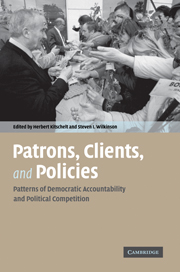Book contents
- Frontmatter
- Contents
- List of figures
- List of tables
- Acknowledgments
- List of contributors
- 1 Citizen–politician linkages: an introduction
- 2 Meet the new boss, same as the old boss? The evolution of political clientelism in Africa
- 3 Monopoly and monitoring: an approach to political clientelism
- 4 Counting heads: a theory of voter and elite behavior in patronage democracies
- 5 Explaining changing patterns of party–voter linkages in India
- 6 Politics in the middle: mediating relationships between the citizens and the state in rural North India
- 7 Rethinking economics and institutions: the voter's dilemma and democratic accountability
- 8 Clientelism and portfolio diversification: a model of electoral investment with applications to Mexico
- 9 From populism to clientelism? The transformation of labor-based party linkages in Latin America
- 10 Correlates of clientelism: political economy, politicized ethnicity, and post-communist transition
- 11 Political institutions and linkage strategies
- 12 Clientelism in Japan: the importance and limits of institutional explanations
- 13 The demise of clientelism in affluent capitalist democracies
- 14 A research agenda for the study of citizen–politician linkages and democratic accountability
- References
- Index
9 - From populism to clientelism? The transformation of labor-based party linkages in Latin America
Published online by Cambridge University Press: 27 October 2009
- Frontmatter
- Contents
- List of figures
- List of tables
- Acknowledgments
- List of contributors
- 1 Citizen–politician linkages: an introduction
- 2 Meet the new boss, same as the old boss? The evolution of political clientelism in Africa
- 3 Monopoly and monitoring: an approach to political clientelism
- 4 Counting heads: a theory of voter and elite behavior in patronage democracies
- 5 Explaining changing patterns of party–voter linkages in India
- 6 Politics in the middle: mediating relationships between the citizens and the state in rural North India
- 7 Rethinking economics and institutions: the voter's dilemma and democratic accountability
- 8 Clientelism and portfolio diversification: a model of electoral investment with applications to Mexico
- 9 From populism to clientelism? The transformation of labor-based party linkages in Latin America
- 10 Correlates of clientelism: political economy, politicized ethnicity, and post-communist transition
- 11 Political institutions and linkage strategies
- 12 Clientelism in Japan: the importance and limits of institutional explanations
- 13 The demise of clientelism in affluent capitalist democracies
- 14 A research agenda for the study of citizen–politician linkages and democratic accountability
- References
- Index
Summary
Labor-based parties faced a dual challenge in the 1980s and 1990s. On the one hand, fiscal crisis, increased capital mobility, and the resurgence of free market ideologies limited parties' capacity to implement pro-labor and welfare statist policies. On the other hand, industrial decline and the expansion of tertiary and informal sectors weakened labor movements, limiting their capacity to deliver the votes, resources, and social peace upon which party–union “exchanges” had traditionally been based. These changes created an incentive for labor-based parties to loosen their ties to unions and target new electoral constituencies (Kitschelt 1994; Koelble 1991, 1992). Such coalitional change often faced intense opposition from unions and party activists. However, non-adaptation risked long-term political decline.
This chapter examines the capacity of contemporary Latin American labor-based parties to “simultaneously manage working-class decline and the rise of new strata” (Esping-Anderson 1999: 315). It argues that unlike the advanced industrialized countries, where the primary electoral challenge lay in appealing to emerging “new middle classes,” Latin American labor-based parties face a dualistic scenario: white-collarization was accompanied by the growth of an even larger stratum of urban informal poor. In this environment, clientelistic linkages often proved more successful than the media-based electoral professional strategies adopted by many European parties.
Parties' capacity to make the transition from labor-based populism to machine politics hinged on three factors: (1) access to a politicized state bureaucracy; (2) levels of electoral competition; and (3) the entrenchment of party–union linkages.
- Type
- Chapter
- Information
- Patrons, Clients and PoliciesPatterns of Democratic Accountability and Political Competition, pp. 206 - 226Publisher: Cambridge University PressPrint publication year: 2007
- 17
- Cited by

